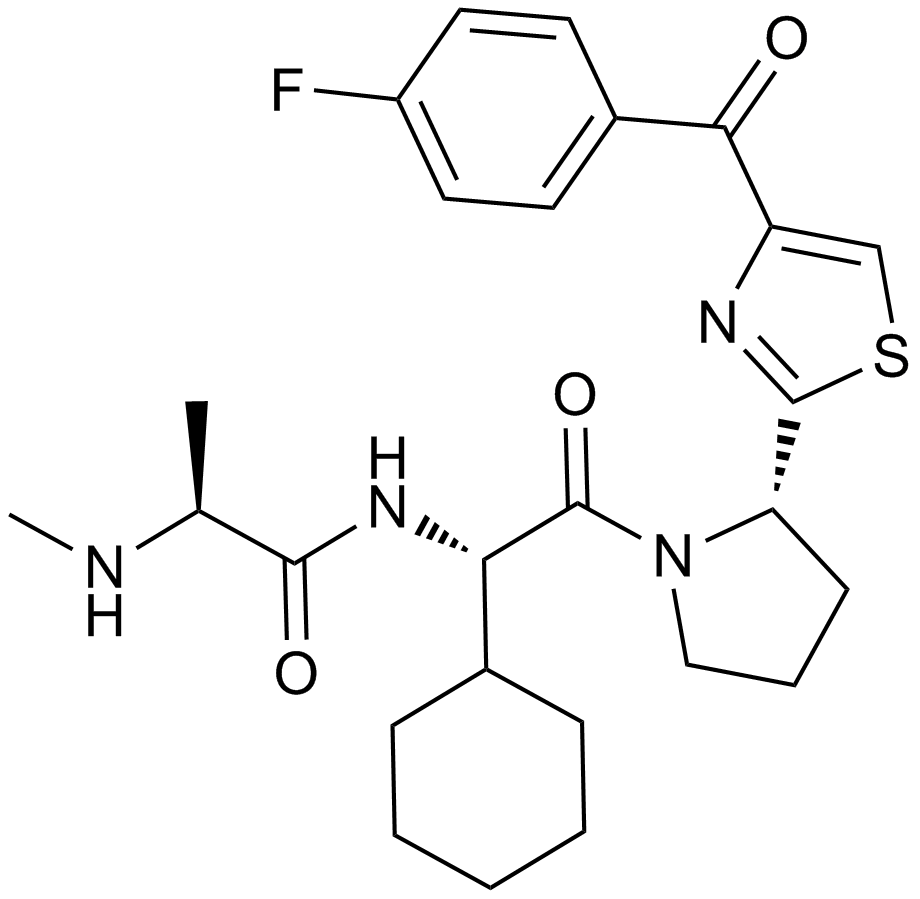LCL161 (Synonyms: LCL-161;LCL 161) |
| Catalog No.GC14291 |
A Smac mimetic and inhibitor of IAP family proteins
Products are for research use only. Not for human use. We do not sell to patients.

Cas No.: 1005342-46-0
Sample solution is provided at 25 µL, 10mM.
LCL161 is a small molecular antagonist of the inhibitor of apoptosis (IAP) with IC50 value of 10.23 μM in Hep3B cells [1].
IAP is a family of proteins which are firstly found in virus and to inhibit the apoptosis of the infected hosts. It contains eight proteins in human. Since they were always found to overexpress in variety of malignant tumors, the IAP are thought to be appropriate targets in cancer therapy. SMAC (second mitochondria-derived activator of caspases) is the first-identified antagonist of IAP. It binds to XIAP within the BIR2/3 domain through its N-terminal segment. As a mimetic of SMAC, LCL161 is designed to be the inhibitor of both XIAP and cIAP1/2 [1].
LCL161 showed significant inhibition of cell proliferation and viability in two human hepatocellular carcinoma (HCC) cells, Hep3B and PLC5. The IC50 values were 10 and 19 μM, respectively. However, LCL161 had no effect in the two other HCC cell lines, Sk-Hep1 (IC50 value of 224 μM) and Huh-7 (IC50 value of 228 μM). The difference of the effects is found to dependent on the expression of Bcl-2 in cells. For the ALL cells, LCL161 exerted growth inhibition with IC50 values of 9.3 and 0.25 μM, respectively. LCL161 also showed effect on the ALCL cell line Karpas-299 with IC50 value of 1.6 μM [1, 2].
In vivo, LCL161 markedly affected the distribution of EFS in many solid tumor xenograft models. It also caused growth delay in some tumors such as osteosarcoma, neuroblastoma and glioblastoma at dose of 30 mg/kg orally. Besides that, LCL161 administration caused significant growth inhibition in EW-5 and BT-39 glioblastoma but not in BT-28. Moreover, the combination therapy of LCL161 and the adeno-associated virus bacteriophage-tumor necrosis factor-α (AAVP-TNF-α) has been reported to has synergistic anti-tumor effects and delayed treatment resistance in mice models of tumor xenografts [1, 2 and 3].
References:
1.Chen K F, Lin J P, Shiau C W, et al. Inhibition of Bcl-2 improves effect of LCL161, a SMAC mimetic, in hepatocellular carcinoma cells. Biochemical pharmacology, 2012, 84(3): 268-277.
2.Houghton P J, Kang M H, Reynolds C P, et al. Initial testing (stage 1) of LCL161, a SMAC mimetic, by the Pediatric Preclinical Testing Program. Pediatric blood & cancer, 2012, 58(4): 636-639.
3.Yuan Z, Syrkin G, Adem A, et al. Blockade of inhibitors of apoptosis (IAPs) in combination with tumor-targeted delivery of tumor necrosis factor-α leads to synergistic antitumor activity. Cancer gene therapy, 2012, 20(1): 46-56.
Average Rating: 5 (Based on Reviews and 30 reference(s) in Google Scholar.)
GLPBIO products are for RESEARCH USE ONLY. Please make sure your review or question is research based.
Required fields are marked with *




















